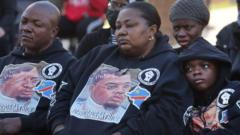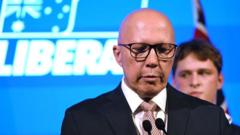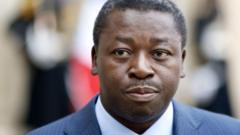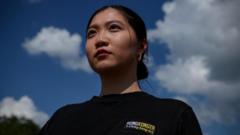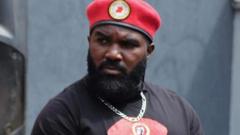In a time of profound political unrest in South Korea, the supporters of impeached President Yoon Suk Yeol depict their cause as a national defense against perceived threats from the opposition and foreign influences, largely fueled by conspiracy theories shared by right-wing media.**
South Korea's Political Divide: The Role of Conspiracy Theories in Turmoil**

South Korea's Political Divide: The Role of Conspiracy Theories in Turmoil**
Amid intense polarization, conspiracy-driven supporters rally around impeached President Yoon Suk Yeol, framing his political crisis as a battle against an alleged leftist insurrection.**
In recent weeks, South Korea has witnessed significant political upheaval revolving around impeached President Yoon Suk Yeol. Thousands of supporters have congregated near the presidential residence, insisting that they are protecting Mr. Yoon from insurrection charges linked to his controversial declaration of martial law last month. Their perspective is shaped by a narrative that accuses opposition parties of abusing their majority in the Assembly to obstruct the president's policy initiatives, which they deem illegitimate following allegations of a rigged election last April.
The fervent supporters, many of whom belong to older generations and align with conservative values, view their actions as a vital stand against what they believe to be an encroaching influence from North Korea sympathizers within South Korean society itself, including institutions like the judiciary and educational systems. This community echoes the sentiments of right-wing influencers online, who propagate conspiracy theories that contribute to the ongoing chaos surrounding Mr. Yoon's presidency.
One fervent supporter, 72-year-old Kim Kwon-seop, articulates the depth of his commitment, stating, “I tell my wife that this may be the last time she sees me alive, because I am ready to die for my cause.” This statement represents a broader sentiment among Yoon's supporters who see their fight as not just for the president's survival, but a safeguarding of their national identity and future for subsequent generations.
The parallel between Yoon's supporters and Donald Trump’s American base manifests in similar nationalist themes, dubbed the “taegeukgi budae” or “national-flag brigade,” who showcase their allegiance through rallies adorned with national flags and patriotic songs. Their rhetoric often targets left-wing politicians, framing them as potential traitors who would jeopardize South Korea’s integrity, asserting that a left-leaning government could lead to undue influence from China and North Korea, thus justifying their zealous defense of the impeached president.
As South Korea grapples with these charged narratives, the conflict highlights the increasing polarization in the nation, where political beliefs are entrenched and dissenting opinions are dismissed. The ongoing protests underscore the blurring line between political support and dangerous levels of fanaticism propelled by fear and conspiracy theories, raising critical questions about the future trajectory of South Korea's democratic framework.
The fervent supporters, many of whom belong to older generations and align with conservative values, view their actions as a vital stand against what they believe to be an encroaching influence from North Korea sympathizers within South Korean society itself, including institutions like the judiciary and educational systems. This community echoes the sentiments of right-wing influencers online, who propagate conspiracy theories that contribute to the ongoing chaos surrounding Mr. Yoon's presidency.
One fervent supporter, 72-year-old Kim Kwon-seop, articulates the depth of his commitment, stating, “I tell my wife that this may be the last time she sees me alive, because I am ready to die for my cause.” This statement represents a broader sentiment among Yoon's supporters who see their fight as not just for the president's survival, but a safeguarding of their national identity and future for subsequent generations.
The parallel between Yoon's supporters and Donald Trump’s American base manifests in similar nationalist themes, dubbed the “taegeukgi budae” or “national-flag brigade,” who showcase their allegiance through rallies adorned with national flags and patriotic songs. Their rhetoric often targets left-wing politicians, framing them as potential traitors who would jeopardize South Korea’s integrity, asserting that a left-leaning government could lead to undue influence from China and North Korea, thus justifying their zealous defense of the impeached president.
As South Korea grapples with these charged narratives, the conflict highlights the increasing polarization in the nation, where political beliefs are entrenched and dissenting opinions are dismissed. The ongoing protests underscore the blurring line between political support and dangerous levels of fanaticism propelled by fear and conspiracy theories, raising critical questions about the future trajectory of South Korea's democratic framework.



